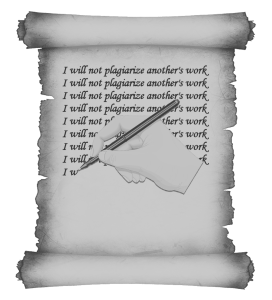19 Plagiarism and Academic Integrity
When you use the words and ideas of others in your own work without citing where you got
that information from, this is considered plagiarism. Whether a student purposely tries to pass off information as their own
(i.e., copying and pasting text or paraphrasing another source without giving credit) or does so unintentionally (i.e., not
knowing how to cite sources), plagiarism goes against the moral and ethical code for students called academic integrity.

Academic integrity is the expectation that all students will be honest and responsible and will not plagiarize or cheat and that
they will be motivated by more than just getting good grades. Most colleges have consequences for violating academic
integrity, which may include suspension or expulsion from the institution. For more information, you can view ECU’s Academic Integrity Pressbook titled, “Academic Integrity at East Central University” or the University website for the official policy.
Sources
This section includes material from the source book, The Insiders: Information Literacy for Okies Everywhere, as well as the following:
“Plagiarism.” Merriam-Webster, 11 July 2023 and “Plagiarism Not Copy Cheat royalty-free stock illustration” by evaggelou via Pixabay / Filtered from original.
Academic integrity is the expectation that all students will be honest and responsible and will not plagiarize or cheat and that
they will be motivated by more than just getting good grades.

